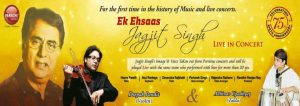In this post Vasundhara Majithia, our Spicy IP Fellowship applicant discusses the recent decision in Chitra Jagjit Singh v The Indian Performing Rights Society in which the IPRS was restrained from granting any license and recovering any license fee in respect of Jagjit Singh’s work.
The Indian Performing Rights Society (“IPRS”) has once again stumbled into a controversy regarding the grant of licences. We have blogged about other controversies involving the IPRS here and here.
Cause of Action
In a recent decision the Delhi High Court restrained the IPRS from granting any license and recovering license fee in respect of works of Jagjit and Chitra Singh. A concert was organized at the Siri Fort Auditorium, New Delhi on March 18, 2016. It was titled “Ek Ehsaas Jagjit Singh Live in Concert”. The advertisements gave the misleading impression that Jagjit Singh (who passed away in 2011) was going to be performing live when in fact his voice was going to be extracted from various live performances during his lifetime and was going to be played along with the live band that had played with him for over 20 years.
The concert was being organised by IPRS and Panache Entertainment Private Limited. According to advertisements, the event was being organized on the occasion of his 75th birth anniversary for charitable purposes.
Issues
However, this did not bode well with the late singer’s wife, Chitra Jagjit Singh (“Plaintiff”) who filed a complaint in the Delhi High Court alleging:
First, that the IPRS was still issuing licenses for the singer’s work despite not being competent to do so under the Indian Copyright Act, 1957 (“Copyright Act”) ; and
Second, that the said concerts breached various intellectual property rights held by her as his surviving heir. Further, she alleged that she had not received any royalty for such a concert previously held in Mumbai.
The Plaintiff submitted that according to a letter previously written by the IPRS to the Government of India, the IPRS had acknowledged that it was not a Copyright Society within the meaning of Section 2(ffd) read with Section 33 of the Copyright Act as its registration had lapsed in 2013 and it had failed to get a new registration certificate since. Thus, it was not competent to grant licences as per the Copyright Act.
Decision of the Court
The Delhi High Court agreed with the Plaintiff and held that the IPRS was incompetent to grant licenses as per Section 33 of the Copyright Act. Further, the Court held that the advertisement was “clearly misleading and, prima facie, breaches the right of privacy and other intellectual property rights of the Plaintiff inasmuch, as, the picture and likeness of late Sh. Jagjit Singh is prominently displayed…..the endeavour of the Defendants clearly appears to mislead the unwary public into believing that late Jagjit Singh would be performing at the show.”
However, since the show was organized for charitable purposes and the tickets were sold out, the Court allowed the concert to be held but directed that the use of the singer’s picture and name, and the portrayal/advertisement as a “live in concert” be discontinued. The Court also directed the IPRS to deposit an amount of Rs. 5 lakhs to secure the rights of the Plaintiff. The Court also restrained the IPRS from holding any such similar concerts in the future without prior permission of the Court.
Analysis
This is a landmark decision where the Court, for the first time held that the IPRS cannot grant licences in respect of any works. It was imperative that this position be cleared, as the Novex decision had still left room for some room for unregistered societies. In the Novex case, the Court held that a ‘duly authorized agent’ under Section 30 of the Copyright Act would not be hit by the prohibition under Section 33. Hence, there was an exception to Section 33 for an unregistered society if it could prove that it was acting as an agent. We had previously blogged about this decision here.
Further, even though the term is not used in the order, the Court in this case recognized the personality rights of Jagjit Singh even after his death and restrained the Defendants from wrongfully using his reputation and likeness for commercial benefit. We have blogged about similar instances of personality rights infringement and passing off here, here and here.
Image from here
